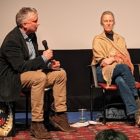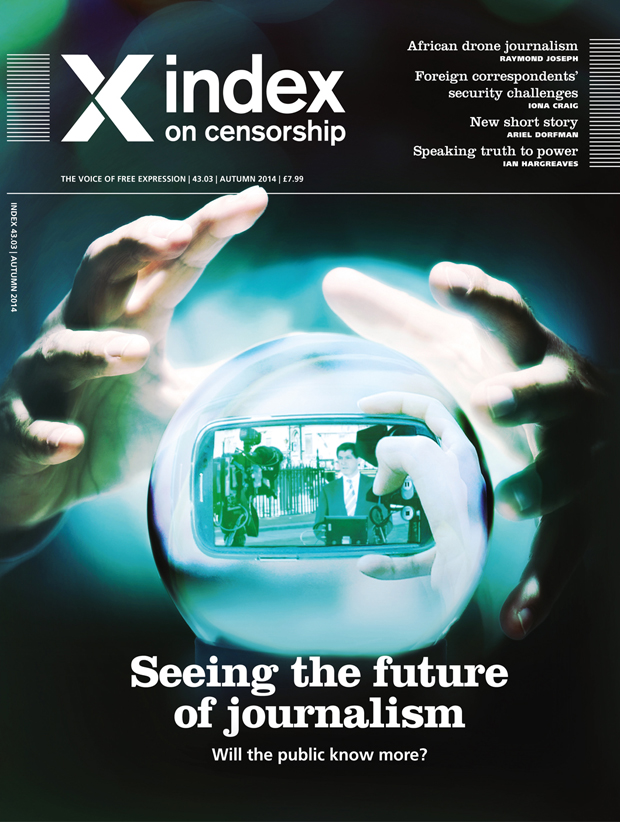Index relies entirely on the support of donors and readers to do its work.
Help us keep amplifying censored voices today.
The title of the play Crimea, 5am refers to the time in the morning the authorities choose to raid the homes of activists in the Russian-occupied territory. It is a time of fear and horror for the Crimean Tatars whose voices make up the text of this verbatim play, taken from the testimonies of the men now held in Putin’s prisons and the families waiting at home for them.
Crimea 5am brings to life one of the lesser-known aspects of the brutal war in Ukraine, which began not in February 2022 but in March 2014. It draws on the oral history of the suppression of the Tatar Muslim minority, who returned to the peninsula in the 1990s following independence after years of exile from their homeland.
Much of what we know of life in Crimea since 2014 has come from activists turned citizen journalists. This is one of the reasons the Russian authorities have cracked down so hard on Tatars, characterizing them either as political extremists or Islamist terrorists linked to the group Hizb-ut-Tahrir.
Two examples from the play show how ordinary Tatars went from being activists, to journalists to dissidents in the face of Russian repression.
Tymur Ibrahimov, 38, moved back to Crimea from Uzbeksitan at the age of six in 1991 after the death of his father. In the play, his wife Diliara, explains his transformation from computer repairman to enemy of the state: “It used to be different, until 2014, you know, back then he would make home videos, he would take pictures of nature, like, of the bees and butterflies on flowers, just like that. It all changed in 2015 and he began making footage of what was going on in Crimea. That is, all the searches, court hearings, “Crimean Solidarity” meetings.” For the crime of recording the resistance of his people Tymur was sentenced to 17 years in prison.
Narminan Memedeminov, 39, also moved back to Crimea from Uzbekistan in 1991. After graduating in economics he became involved in human rights activism and media coordinator for the Crimean Solidarity movement. “Here’s an example: I went and took a video of somebody helping out a prisoner’s family, like, basic stuff, they would take the child to the hospital, help them hang the wallpaper, fix the plumbing, send off the parcels to the detention centre and so on… And in the end, everybody involved was at risk: those who took videos, those who helped, those who did anything at all.”

Index editor at large Martin Bright (left) taking part in a post-play discussion.
The stories have been brought together by two Ukrainian writers, Natalia Vorozhbyt and Anastasiia Kosodii and the project is backed by the Ukrainian Institute and the Ukrainian Ministry of Foreign Affairs as a way of bringing the situation to international attention. I had the privilege of watching a reading of of the play at the Kiln Theatre, Kilburn in London last week with professional actors alongside non-professional activists and supporters. Directed by Josephine Burton and produced by Dash Arts, the play focuses on the domestic lives of the families of the Tatar political prisoners and particularly the women.
Burton told Index that until the 2022 Russian invasion of Ukraine, Crimea has drifted from international attention. “Helped by a media blackout, we forgot that the peninsula has been occupied by Russians for almost nine years now and its Tatar community oppressed,” she said. “Determined to fight this silence, the community has relentlessly documented this oppression – filming and uploading searches, arrests and court cases of its people by the Russian Security Forces. And for this act, these “Citizen Journalists” have been arrested themselves and given insanely long sentences, some for up to 20 years in penal colonies.”
Crimea 5am focuses on the everyday lives of Tatar dissidents, drawn from many hours of recordings with the families of 11 political prisoners. “It builds a beautiful and powerful portrait of a community, ripped apart by this tragedy, but also woven with stories of love and resilience through the prism of the wives left behind. It is this mix of tenderness and humour alongside the unfathomable darkness which enables its impact. We the audience become invested in their lives and feel the impact of their tragedy deeply.”
Dash Arts is looking for further opportunities to perform Crimea 5am: https://www.dasharts.org.uk/
This event is SOLD OUT. A live stream is available on this page and you can follow the online discussion via #futurejournalism. You can also email [email protected] to be added to the waiting list.
Don’t miss the launch of the autumn edition of the Index on Censorship magazine, where there will be lively discussion around the question: Eyes Wide Shut? Will The Future of Journalism Mean We Are Any Better Informed? The discussion will tackle questions about whether changes within journalism will leave the public knowing more or less than they have in the past. Will new technologies bring us greater depth of information? Will news survive or will celebrity gossip take over? Will citizen journalism carry more weight than traditional TV channels?
The event will be chaired by columnist, author and Index chairman David Aaronovitch, and introduced by Index on Censorship magazine editor Rachael Jolley.
Speakers include:
WHEN: 630pm, Wednesday 22 October
WHERE: Frontline Club, 13 Norfolk Place, London W2 1QJ (map)
This event is SOLD OUT. A live stream of the event will be available from this page on Oct 22.
See footage from the launch of the summer magazine here.
[vc_row][vc_column][vc_custom_heading text=”The explosion of social media, the rise of citizen reporters, the dangers of freelancing in a war zone, the invention of new technology: journalism is clearly going through its biggest changes in history. But will the public know more or less as a result?”][vc_row_inner][vc_column_inner width=”1/2″][vc_column_text]
[/vc_column_text][/vc_column_inner][vc_column_inner width=”1/2″][vc_single_image image=”59980″ img_size=”full”][/vc_column_inner][/vc_row_inner][vc_column_text]
[/vc_column_text][/vc_column][/vc_row][vc_row][vc_column][vc_custom_heading text=”SPECIAL REPORT: THE FUTURE OF JOURNALISM” css=”.vc_custom_1483551011369{margin-right: 0px !important;margin-left: 0px !important;border-bottom-width: 1px !important;padding-top: 15px !important;padding-bottom: 15px !important;border-bottom-color: #455560 !important;border-bottom-style: solid !important;}”][vc_column_text]
[/vc_column_text][/vc_column][/vc_row][vc_row][vc_column][vc_custom_heading text=”IN FOCUS” css=”.vc_custom_1481731813613{margin-right: 0px !important;margin-left: 0px !important;border-bottom-width: 1px !important;padding-top: 15px !important;padding-bottom: 15px !important;border-bottom-color: #455560 !important;border-bottom-style: solid !important;}”][vc_column_text]
[/vc_column_text][/vc_column][/vc_row][vc_row][vc_column][vc_custom_heading text=”CULTURE” css=”.vc_custom_1481731777861{margin-right: 0px !important;margin-left: 0px !important;border-bottom-width: 1px !important;padding-top: 15px !important;padding-bottom: 15px !important;border-bottom-color: #455560 !important;border-bottom-style: solid !important;}”][vc_column_text]
[/vc_column_text][/vc_column][/vc_row][vc_row][vc_column][vc_custom_heading text=”COLUMNS” css=”.vc_custom_1481732124093{margin-right: 0px !important;margin-left: 0px !important;border-bottom-width: 1px !important;padding-top: 15px !important;padding-bottom: 15px !important;border-bottom-color: #455560 !important;border-bottom-style: solid !important;}”][vc_column_text]
[/vc_column_text][/vc_column][/vc_row][vc_row][vc_column][vc_custom_heading text=”END NOTE” css=”.vc_custom_1481880278935{margin-right: 0px !important;margin-left: 0px !important;border-bottom-width: 1px !important;padding-top: 15px !important;padding-bottom: 15px !important;border-bottom-color: #455560 !important;border-bottom-style: solid !important;}”][vc_column_text]
[/vc_column_text][/vc_column][/vc_row][vc_row][vc_column][vc_custom_heading text=”SUBSCRIBE” css=”.vc_custom_1481736449684{margin-right: 0px !important;margin-left: 0px !important;border-bottom-width: 1px !important;padding-bottom: 15px !important;border-bottom-color: #455560 !important;border-bottom-style: solid !important;}”][vc_column_text]Index on Censorship magazine was started in 1972 and remains the only global magazine dedicated to free expression. Past contributors include Samuel Beckett, Gabriel García Marquéz, Nadine Gordimer, Arthur Miller, Salman Rushdie, Margaret Atwood, and many more.[/vc_column_text][vc_row_inner][vc_column_inner width=”1/2″][vc_single_image image=”76572″ img_size=”full”][/vc_column_inner][vc_column_inner width=”1/2″][vc_column_text]In print or online. Order a print edition here or take out a digital subscription via Exact Editions.
Copies are also available at the BFI, the Serpentine Gallery, MagCulture, (London), News from Nowhere (Liverpool), Home (Manchester), Calton Books (Glasgow) and on Amazon. Each magazine sale helps Index on Censorship continue its fight for free expression worldwide.
![]() SUBSCRIBE NOW[/vc_column_text][/vc_column_inner][/vc_row_inner][/vc_column][/vc_row]
SUBSCRIBE NOW[/vc_column_text][/vc_column_inner][/vc_row_inner][/vc_column][/vc_row]

Index on Censorship autumn magazine
In the autumn issue of Index on Censorship magazine, don’t miss: Burmese-born author Wendy Law-Yone on the challenges the Burma’s media face in the run-up to the next election; TV journalist Samira Ahmed on how television channels should respond to viewers’ complaints; award-winning foreign correspondent Iona Craig reports from Yemen on threats to journalism in conflict zones; plus a brand new short story from playwright and author Ariel Dorfman.
While debates on the future of the media tend to focus solely on new technology and downward financial pressures, we ask: will the public end up knowing more or less? Will citizen journalists bring us in-depth investigations? Will crowd fact-checking take over from journalists doing research? Who will hold power to account? The subject is tackled from all angles, from our writers from across the globe.
Also writing for this issue are Australia’s race commissioner Tim Soutphommasane; human rights lawyer Tamsin Allen on defamation; and novelist Kaya Genc. From South Korea Steven Borowiec talks to controversial artist Lee Ha, and in London political editor Ian Dunt walks the corridors of political power in the UK’s Houses of Parliament and asks if journalists there get too close to government.
Other articles include:
You can buy the print version magazine or subscribe for £31 per year here, or download a digital version for your iPad for just £1.79. All subscriptions help fund Index’s work, protecting freedom of expression worldwide.
Read about our magazine launch at the Frontline Club on 22 October.
FULL CONTENTS: ISSUE 43, 3 – The future of journalism
Back to the future: Iona Craig on journalists trying to stay safe in war zones
Digital detectives: Ray Joseph on the new technology helping Africa’s journalists investigate
Re-writing the future: Five young journalists talk on their hopes and fears for the profession – from Yemen, India, South Africa, Germany and the Czech Republic
Attack on ambition: Dina Meza on a Honduran generation ground down by fear
Stripsearch cartoon: Martin Rowson envisages an investigative reporter meeting Deep Throat
Generation why: Ian Hargreaves asks on how the powerful may or may not be held to account in the future
Making waves: Helen Womack reports from Russia on the radio station standing up for free media
Switched on and off: US journalist Debora Halpern Wenger on TV’s power shift from news producers to news consumers
TV news will reinvent itself (again): Taylor Walker interviews a veteran TV reporter on the changes ahead
Right to reply: Samira Ahmed on how the BBC tackles viewers’ criticism
Readers as editors: Stephen Pritchard on how news ombundsmen create transparency
Lobby matters: Political reporter Ian Dunt on the push/pull of journalists and politicians inside Britain’s corridors of power
Funding news freedom: Glenda Nevill looks at innovative ways to pay for reporting
Print running: Will Gore on how newspapers innovate for new audiences
Paper chase: Luis Carlos Díaz on overcoming Venezuela’s newsprint shortage
IN FOCUS
Free thinking? Australia’s race commissioner Tim Soutphommasane on bigotry
Guarding the guards: Jemimiah Steinfeld on China’s human rights lawyers becoming targets
Taking down the critics: Irene Caselli investigates allegations that Ecuador’s government is silencing social media users
Maid equal in Brazil: Claire Rigby on the Twitter feed giving voice to abuse of domestic workers in Brazil
Home truths in the Gulf: Georgia Lewis on how UAE maids fear speaking out on maltreatment
Text messaging: Indian school books are getting “Hinduised”, reports Siddarth Narrain from India
We have to fight for what we want: our editor, Rachael Jolley, interviews the OSCE’s Dunja Mijatovic on 20 years championing free speech
Decoding defamation: Lesley Phippen’s need-to-know guide for journalists
A hard act to follow: Tamsin Allen gives a lawyer’s take on Britain’s libel reforms
Walls divide: Jemimah Steinfeld speaks to Chinese author Xiaolu Guo about a life of censorship
Taking a pop: Steven Borowiec profiles controversial South Korean artist Lee Ha
Mapping media threats: Melody Patry and Milana Knezevic look at rising attacks on journalists in the Balkans
Holed up in Harare: Index’s contributing editor Natasha Joseph reports from southern Africa on the dangers of reporting in Zimbabwe
Burma’s “new” media face threats and attack: Burma-born author Wendy Law-Yone looks at news in the run up to the impending elections
Head to head: Sascha Feuchert and Charlotte Knobloch debate whether Mein Kampf should be published
CULTURE
Political framing: Kaya Genç interviews radical Turkish artist, Kutlug Ataman
Action drama: Julia Farrington on Belarus Free Theatre and the upcoming Belarus election
Casting away: Ariel Dorfman, a new short story by the acclaimed human rights writer
ALSO
Index around the world: Alice Kirkland gives a news update on Index’s global projects
From the factory floor: Vicky Baker on listening to the world’s garment workers via new technology